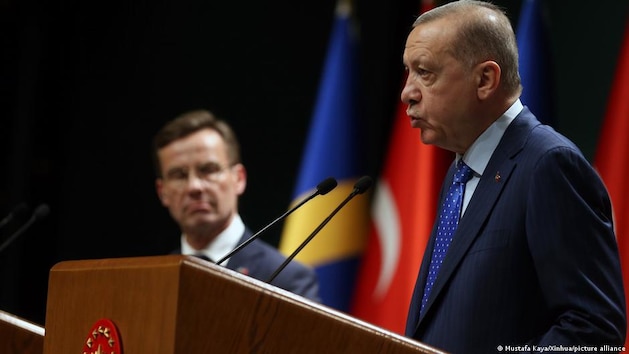Turkish President Recep Erdogan has indicated for the first time that he can agree to Finland joining NATO. “If necessary, we can give a different answer regarding Finland,” Erdogan said last Sunday.
NATO member Turkey has been blocking the admission of Finland and Sweden to the western military alliance for months. In contrast to Finland, Ankara’s approval of Sweden’s NATO membership is still a long way off. Both northerners had applied to be included in the military defense alliance after the Russian attack on Ukraine on February 24, 2022. This requires the approval of all 30 member countries.
Relations between Turkey and the two Scandinavian countries have been strained over dealings with what Ankara has labeled “terrorists”. These are mainly members of the banned Kurdistan Workers’ Party (PKK) and the movement of the Islamic preacher Fethullah Gülen.
Turkey accuses Sweden and Finland of being “havens for terrorists”. They are said to house “around 130 terrorists” whose extradition Erdogan is demanding. Ankara has given lists of suspected terrorists to Sweden and Finland, according to Turkey. How many extradition requests were made to Finland and how many to Sweden is not specified.
The significantly larger part of the alleged 130 “terrorists” should be assigned to Sweden. Because of the Kurds who flee Turkey for political reasons, many choose Sweden as their new home. According to estimates, around 85,000 Kurds were already living in Sweden in 2016. According to national statistics, there were just under 16,000 Kurds living in Finland – also the country with the significantly smaller population overall – in 2021.
Turkey’s media close to the government also repeatedly publish figures whose accuracy cannot be checked. The state news agency Anadolu reported in mid-May 2022 that in the past five years Ankara had requested the extradition of six suspected PKK supporters and six suspected supporters of the Gülen movement from Finland. Sweden, in turn, ordered the extradition of ten suspected Gülen supporters and eleven suspected PKK members.
The extradition of journalist Bülent Kenes, an alleged member of the Gülen movement, was raised personally by Erdogan at a joint press conference with Swedish President Ulf Kristersson in Turkey in November. His extradition was refused by Sweden shortly before the end of the year. However, in early December 2022, Sweden extradited a suspected PKK member.
Neither Sweden nor Finland have official ties to the PKK, but like most Western countries and the EU classify them as a terrorist organization. In the course of its fight for the rights of the Kurds in Turkey, the underground organization has repeatedly been held responsible for bloody attacks.
Under pressure from Turkey, Sweden has now also distanced itself from the armed Kurdish militia in Syria, YPG. Swedish Foreign Minister Tobias Billström said in November last year that his government no longer wanted to support the YPG and its political arm, the PYD. The two organizations are considered to be closely linked to the PKK.
The Gülen movement, on the other hand – accused by the Turkish government of masterminding the attempted coup in 2016 – is not considered a terrorist organization in Europe.
In June 2022, on the sidelines of the NATO summit in Madrid, Turkey signed a memorandum with Sweden and Finland in which the three countries wanted to intensify their cooperation in the fight against terrorism. But the way of combating it is different in the three countries.
Turkey expert Paul Levin explains in an interview with the ARD that the terror legislation in Sweden is much more limited than in Turkey: “For example, it is not specifically forbidden to be a member of a terrorist organization. You have to prove that acts of terrorism were planned or carried out. Equally, freedom of speech legislation is very liberal. Ultimately, this means that the Swedish police cannot stop PKK supporters, for example, if they wave PKK flags in Swedish marketplaces.” The Turkish side sees this as tolerating the PKK, says the director of the Institute for Turkish Studies at Stockholm University the end.
Erdogan recently said: “We often see PKK events on the streets of these countries and warn the governments. So far, despite our warnings, they have not prevented these protests. They believe that Turkey would be the old one. no If they don’t take action against such groups, our relationship with Sweden will become even more strained.”
The quote already indicates that Turkey is actually more concerned with Sweden than with Finland. According to expert Levin, Finland is “basically just a hostage in this drama, which is more about Swedish-Turkish relations”.
Political scientist Turkey expert Hürcan Aslı Aksoy also told DW that Sweden is the main enemy for Turkey due to the larger Kurdish diaspora. In view of the upcoming elections in Turkey, choosing such a tactic is one of the incumbent president’s tactics: “Erdogan is trying to strengthen his conservative and nationalist base before the elections on May 14.”
After a right-wing extremist burned a copy of the Koran in front of the Turkish embassy in Stockholm in Sweden, Aksoy says Ankara fueled Turkey’s anger at Sweden even further. For Erdogan, this is one more reason to continue blocking the country’s NATO membership.
Author: Ines Eisele, Elmas Topcu
The original of this article “Erdogan’s resentment against Sweden’s NATO accession” comes from Deutsche Welle.








